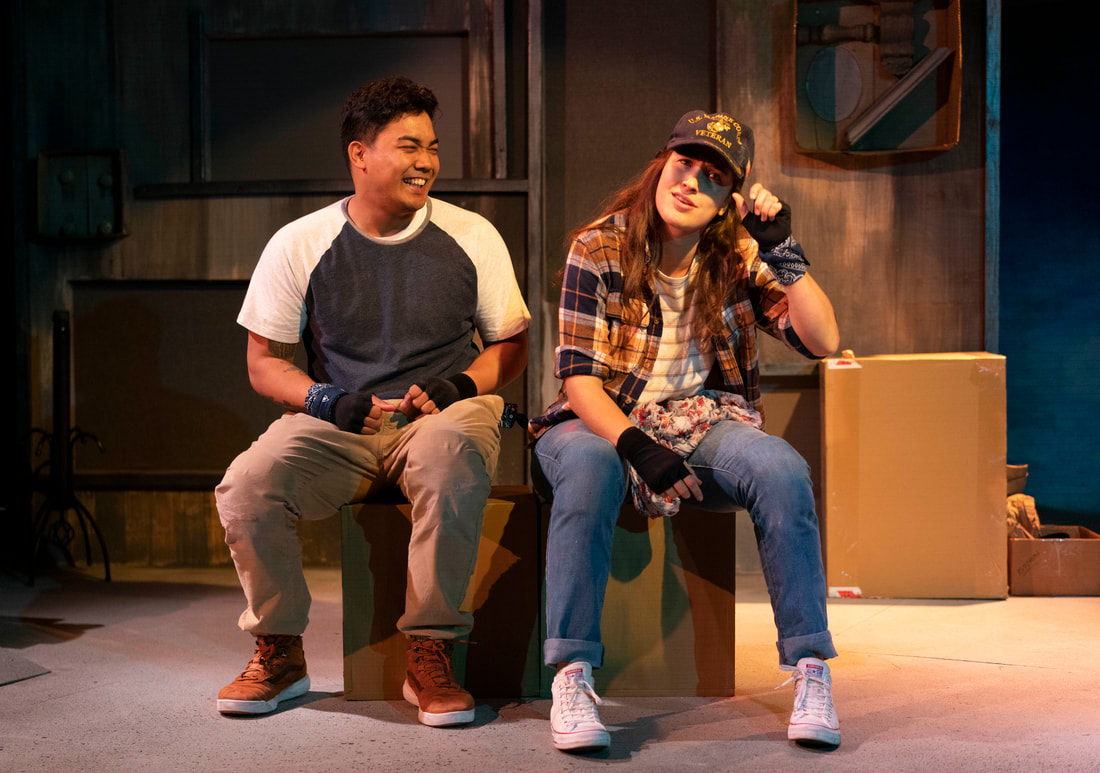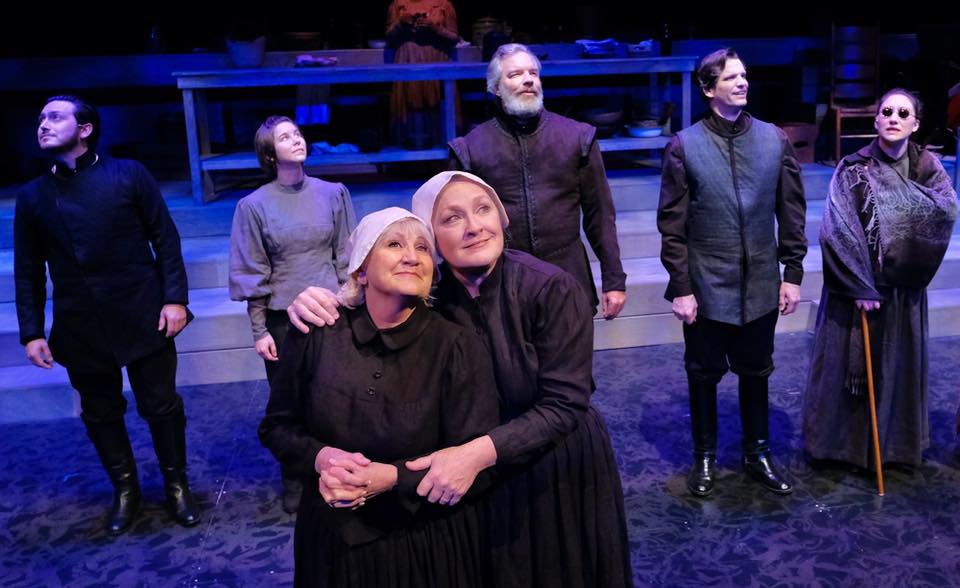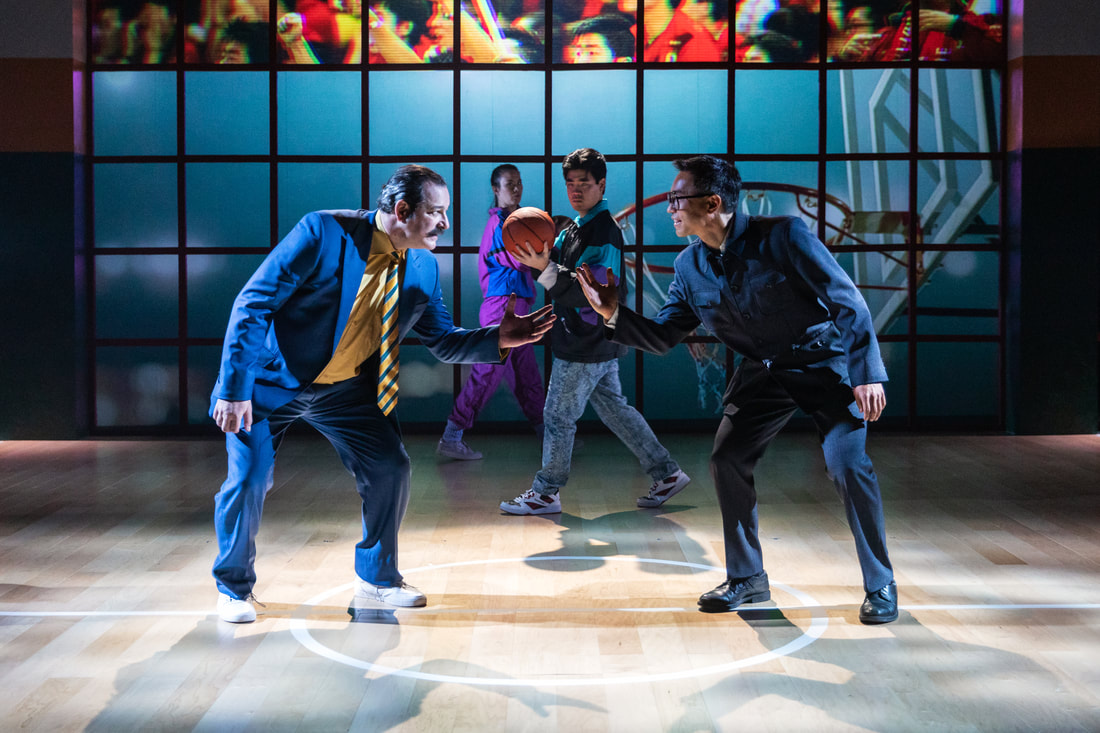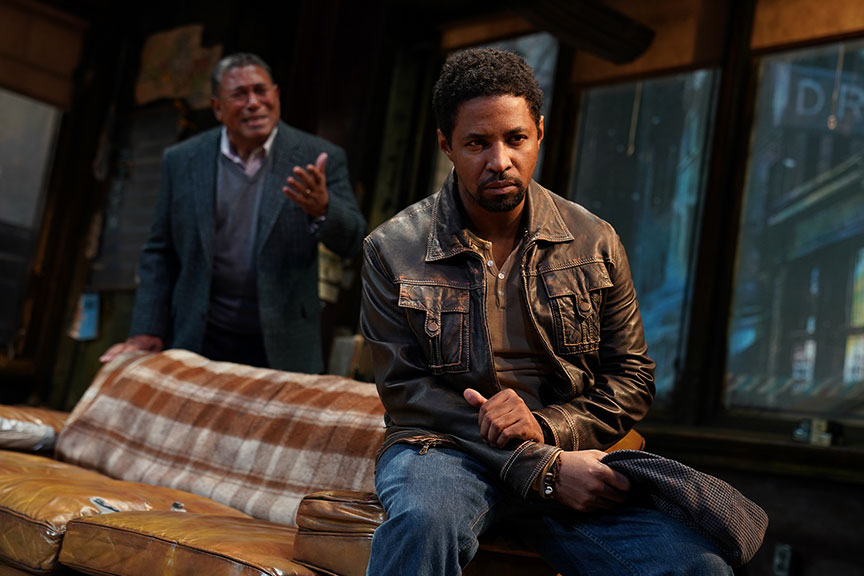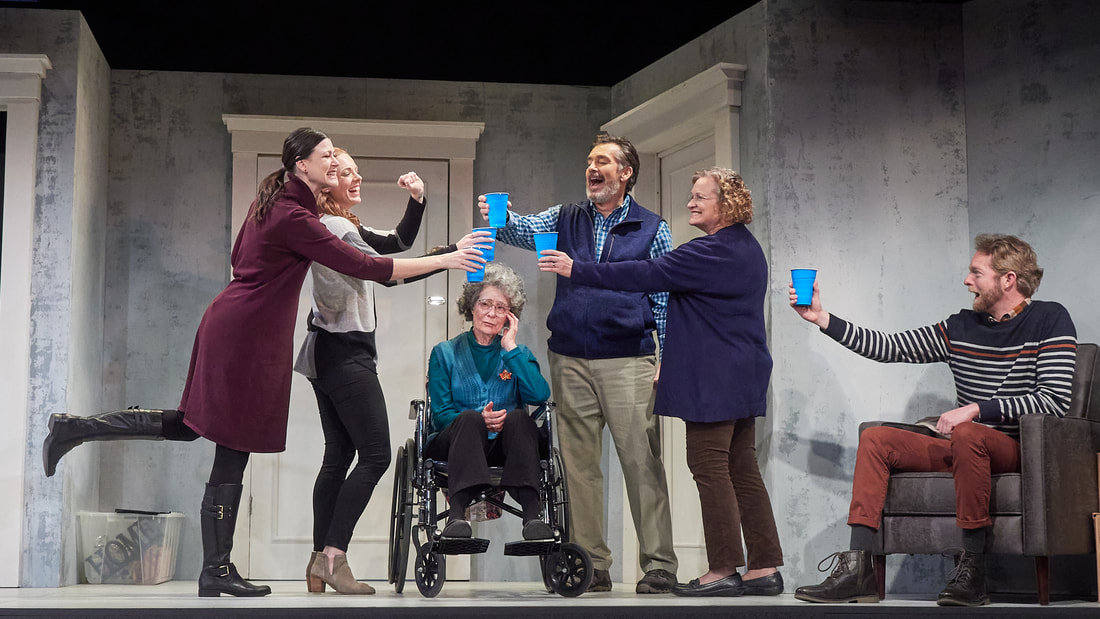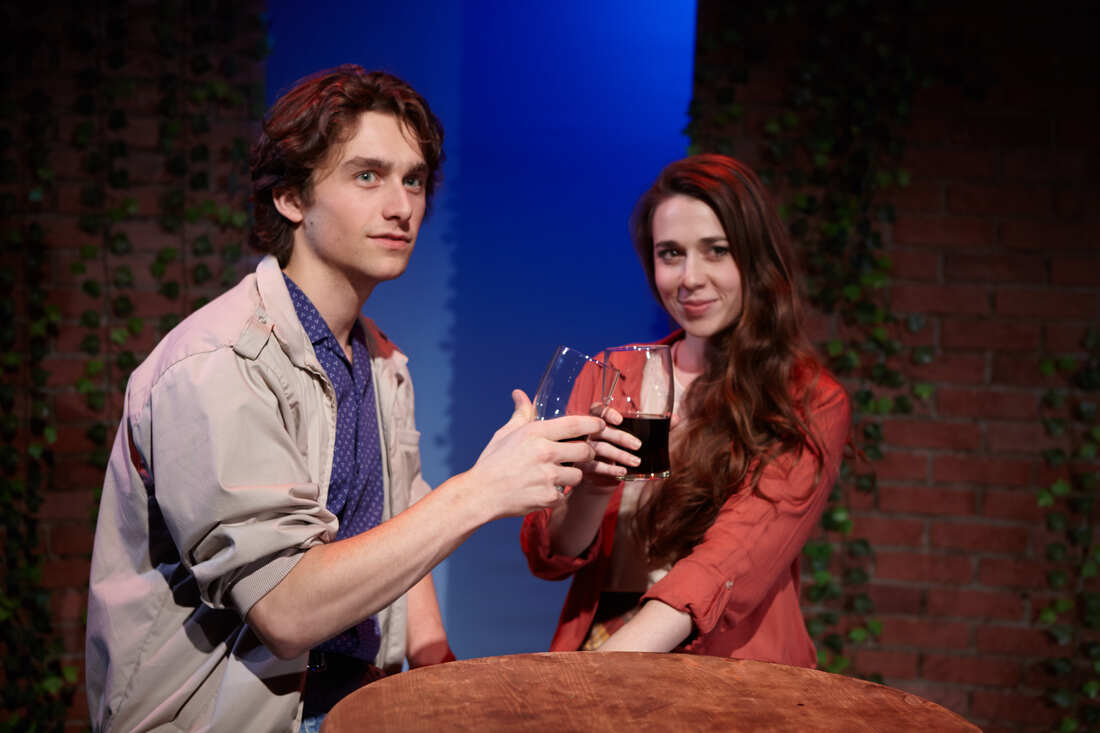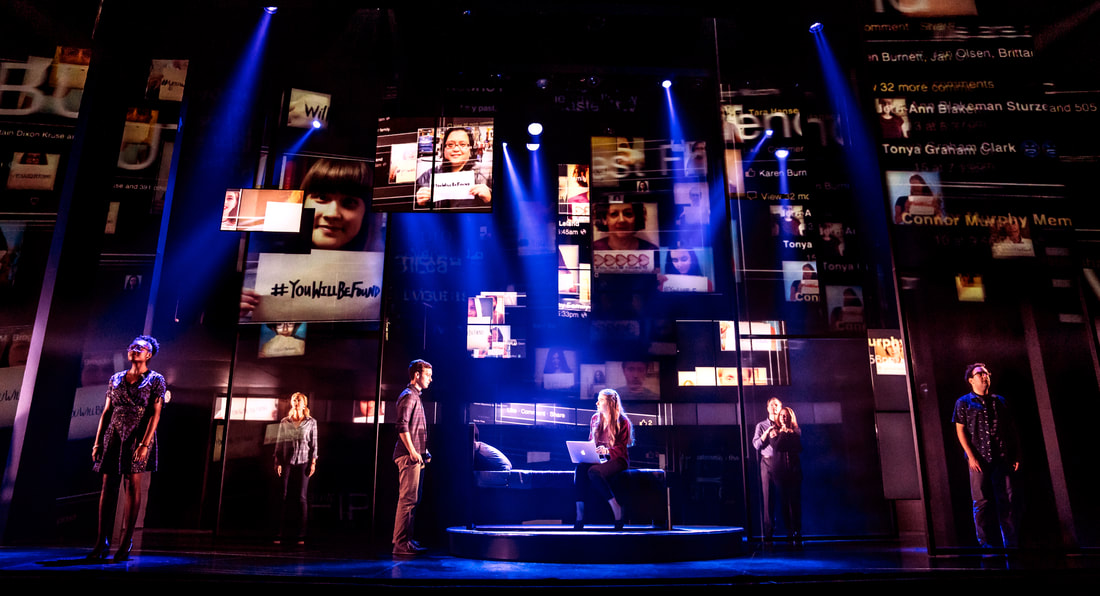|
Timothy L. Cabal and Nancy Ross in "Red Bike." Photo courtesy of Moxie Theatre My first bicycle was a red one, and while I had my share of adventures with it, I never experienced a ride as wild as the one the 11-year-old kid (played concurrently by two actors) in Moxie Theatre's production of "Red Bike" does. Caridad Svich's 11-year-old (portrayed by Timothy L. Cabal and Nancy Ross) learns more about realities and priorities -- in other words, about life -- in one fateful ride than I did through all the years until I traded a bike for my first car. Svich's play is a non-linear, experiential (and some might say experimental) narrative that creates the illusion that this adolescent is learning on the fly and we're along for the ride so to speak.
As Svich, a grad of UCSD's MFA program, explained in her director's note for the Moxie production, "Time is flexible" in "Red Bike." The past, present and imagined future converge, sometimes it seems with the abruptness of screeching coaster brakes. At the same time, the story's one character is in the process of confronting fears, examining the physical and metaphorical constraints of small-town life, and coming to terms -- to the extent that an 11-year-old can -- with questions of identity. It requires suspension of disbelief to accept that anyone of 11 years old would entertain such philosophizing and would throughout the 90-minute play give voice to some of the intellectually sophisticated insights accrued during. That's not asking too much. "Red Bike" speaks to the children in all of us as it recalls the children we once were: wide-eyed, in physical and emotional transition, and dwarfed by the convolutions of our world. Still, it's the physicality of this production, admirably directed by Lisa Berger, that is so imposing. Cabal and Ross run, flit, leap, climb, jump, improvise pedaling and much more in twin gymnastic performances upon Alondra Velez's skateboard ramp of a set. They hide well the exhaustion that anyone might feel from such rigor. It's not the non-linear nature of "Red Bike," however that renders this production wearying. What is decreed and derided and acknowledged in an hour and a half could have been decreed and derided and acknowledged in about 45 minutes, perhaps less. Beyond that your inquiring mind is apt to wander, even as you wonder at Cabal and Ross' endurance. "Red Bike" runs through Feb. 16 at Moxie Theatre in Rolando.
0 Comments
Kerry Meads (left) and Deborah Gilmour Smyth (both in foreground) in "Babette's Feast." Photo by Ken Jacques The redemptive power of an exquisite, meticulously prepared meal has been demonstrated on many occasions in narrative storytelling, perhaps no more sublimely than in the 1958 short story by Karen Blixen (aka Isak Dinesen) "Babette's Feast." The French civil war refugee who has become housekeeper and cook to a pair of devout spinster sisters in 19th-century Norway is the magician behind the meal. The very dishes that she prepared when she was once head chef at Paris' Cafe Anglais before fleeing have the effect of resolving grievances and reconciling past and present.
How the story of "Babette's Feast" gets to this titular moment is the dramatic arc of Abigail Killeen's play based on the original short story and adapted by Rose Courtney. ("Babette's Feast" previously, and more famously, was adapted into a 1987 Danish movie starring Stephane Audran that would win the Academy Award for Best Foreign Language Film.) Lamb's Players Theatre in Coronado is staging the West Coast premiere of Killeen's play, with the company's Robert Smyth directing. As Smyth explained to the audience prior to a recent performance, "Babette's Feast" is "story theater" in which the actors narrate the plot even as they inhabit one or multiple characters. This is not an unusual theatrical device, but it's not a favorite of mine as it tends to make a production highly expository in nature and, to me, sometimes static. That aside, the Lamb's production is eloquent, soothing and quite beautifully mounted, with music compiled and directed (and some of it composed) by Deborah Gilmour Smyth (who also performs as the spinster sister Philippa) and performed onstage by cellist Diana Elledge. The music, in fact, is the piece de resistance of the play: the operatic duets, in particular, between Caitie Grady and Charles Evans Jr. are spellbinding. "Babette's Feast" is told in two time periods: the past, when young Philippa (Grady) and sister Martine (Rachael VanWormer), daughters of a strictly devout dean (Jason Heil), are being courted by dashing suitors (Evans as an opera star and Ross Hellwig as a military man). For different reasons, the romances are not realized to fruition, and when we catch up with Philippa and Martine (in later years played by Gilmour Smyth and Kerry Meads) all they seem to have left is their piety and good works in the little village of Berlevag. When Babette (Yolanda Marie Franklin) turns up, having been sent to them by the aforementioned -- also older -- opera star, the journey to reconciliations and redemptions begins in earnest. Almost everyone in the cast is obliged to adopt the utmost sincerity and seriousness on the way to Babette's grand repast. Almost, because Omri Schein, a familiar comic performer on several San Diego theater stages each year, breaks up the tension and breaks up the audience too with his dead stares and cross-dressing. At an economical 90 minutes in length, Lamb's' "Babette's Feast" escapes over-ruminating without losing its messaging. The live music, the vocals of Grady and Evans, Jemima Dutra's period costumes and reminders that anything is possible on the other side, where paradise awaits, combine for a sumptuous, heartening evening or matinee on Coronado Island. "Babette's Feast" runs through Feb. 16 at Lamb's Players Theatre in Coronado. Foreground: Manny Fernandes (left) and Edward Chen in "The Great Leap." Karli Cadel Photography As was demonstrated in La Jolla Playhouse's production last fall of Lauren Yee's "Cambodian Rock Band," the extraordinarily gifted playwright, an MFA graduate of UCSD, possesses the ability to confront intricate political issues by humanizing in startling and intimate ways those in their sphere of influence. Her characters are genuine and vulnerable, her dialogue sharp and incisive.
Yee's "The Great Leap" was first heard locally two years ago in a Powers New Voices Festival reading at the Old Globe. It premiered shortly after at the Ricketson Theatre in Denver and later in 2018 appeared Off Broadway. Its arrival at Cygnet Theatre in Old Town is noteworthy and the production itself, it turns out, reason for celebration. "The Great Leap" is a nuanced and cerebral work that at Cygnet under Rob Lutfy's direction receives an exquisite staging. The play's title is a reference to the so-called "Great Leap Forward," the People's Republic of China's socioeconomic campaign to embed a Communist society in the late '50s/early '60s. Yee's fictional story, however, begins in 1971 when a visiting American college basketball coach boasts that no Chinese team would ever beat one from the USA. This hubris has ridden the passage of time to 1989, the year of the play's principal setting (and a benchmark in China's recent history), when that same coach (Manny Fernandes) is invited to return to China with his struggling (an 8-20 won/less record) University of San Francisco basketball team to play a squad from the University of Beijing. Enter 17-year-old Manford Lum (Scott Keiji Takeda), a Chinatown hoops legend who begs coach Saul to add him to his roster. The third key figure is Wen Chang (Edward Chen), whose friendship Saul cultivated while visiting China the first time and who at his pushy-American urging became a basketball coach himself. He is the coach of the team that Saul's boys will confront. What secrets await revealing both on American and Chinese soil are central to the soul and backbone of "The Great Leap," which it should be said is only nominally about basketball (though the game carries the story and furnishes metaphorical reminders throughout its telling). Without giving away more than I should, "The Great Leap" is about family, about personal accountability and seizing opportunities, about how loving from afar is sometimes the best that one can do, and about courage. The last 10 minutes of the play will -- and should -- leave you breathless. Chen is remarkable as the play's most conflicted character, a man in whom to some extent all the story's internal strife resides. Fernandes, who is a Cygnet resident artist, gets the plum job of spewing coach-speak profanity, and his green-and-gold USF garb gives him the appearance of a gruff but likable toon. The passion and impatience of youth are personified ably in Takeda's Manford, slight but lionhearted. "The Great Leap" literally plays out on a basketball court of a stage designed by Yi-Chien Lee. Projections by Blake McCarty carry us back and forth in time, from here to there in history, from a Bay Area gym to Tiananmen Square. The first unmissable production of 2020 on San Diego stages, "The Great Leap" is urgent, profoundly felt theater. "The Great Leap" runs through Feb. 16 at Cygnet Theatre in Old Town. Steven Anthony Jones and Amari Cheatom (foreground) in "Jitney." Photo by Joan Marcus The daunting struggles for survival and personal dignity reside in Jim Becker's gypsy cab station. The year is 1977, the place Pittsburgh's embattled Hill District. The play is "Jitney," the first work written in the late August Wilson's "Pittsburgh Cycle" though the latest chronologically of the 10. As staged at the Old Globe Theatre and directed by Ruben Santiago-Hudson, it's a penetrating, hang-on-every-word drama that touches sparks with every interpersonal conflagration.
The bracing intensity of the play is heightened by the richness of its principal characters: old Becker himself (Steven Anthony Jones), whose rules are posted on a wall in the ramshackle garage and whose iron fist is softened by a practically paternal sensitivity to those in his employ, however flawed; Turnbo (Ray Anthony Thomas), an old gossip with a hot head and a weary but resignedly workmanlike way of doing his job -- taxiing fares that the name cab companies won't accommodate; Youngblood (Amari Cheatom), whose very name defines his youth, impetuosity and sometimes reckless bravado; Fielding (Anthony Chisholm), whose alcoholism makes driving for Becker at best a day-to-day proposition. He's an old soul more comfortable reminiscing about his days as a suit-maker for Billy Eckstine and Count Basie; and Booster (Francois Battiste), Becker's 39-year-old son, who is released from prison after serving 20 years for killing his girlfriend and who shows up at his father's door -- the father whose heart he shattered and who never visited him in the pen. "Jitney" hinges on two ominous and complex conflicts: the bitter and unexpected reuniting of Becker and his son, and the prospect that the garage, out of which Becker's car service operates, will be shuttered to make way for a vaguely promised redevelopment project. But the rumblings of this play are woven in, out of, and in between the crisis points and realized in a series of conversations, revelations and showdowns (including one with a heavily breathing Turnbo aiming a gun at stiffly defiant Youngblood). The beauty of "Jitney" is that neither its storytelling nor its characters is without tenderness. For all their flareups and foibles, the men of Becker's car service care about each other and definitely return the affection their boss holds for them. Youngblood, too, is in his swaggering way trying to make a life for the mother of his child (Nija Okoro) and their two-year-old son. There is no tenderness between Becker and Booster. Just the searing flame of anger and the pain of disappointment and loss. Their faceoffs in the garage are fierce with tension. Anything could happen. Santiago-Hudson directs with a palpable appreciation for Wilson's words and affords his cast room to explore their characterizations, as if moment by moment. The Globe production incorporates atmospheric original music by Bill Sims Jr. in transitioning between scenes, with the riffing notes a striking parallel to the riffing being voiced onstage and creating a jazzy tableau beneath Jane Cox's lighting. The set by David Gallo is meticulous and funkily shopworn, with even the suggestion of one of the old jitney automobiles behind musty window glass. August Wilson's legacy at the Old Globe is a well-established one. "The Piano Lesson," "Two Trains Running" and "Joe Turner's Come and Gone" each premiered at the Balboa Park theater. "Jitney," first produced in Pittsburgh, did not begin at the Globe. But its arrival four decades later only burnishes that legacy. "Jitney" runs through Feb. 16 at the Old Globe Theatre in Balboa Park. Don't be fooled. This is not a happy Thanksgiving in "The Humans." Photo by Jim Carmody Meet the Blakes -- and brace yourself for a major depressive episode.
Father Erik is over-drinking, under-sleeping, having nightmares and harboring secrets. Mother Deirdre is fighting a losing battle with counting calories and is (barely) staving off weepiness. Daughter Aimee has been given the gate by her lover and is about to be given the same by her employer, a prestigious Philadelphia law firm. She also is suffering from ulcerative colitis and is facing surgery. Daughter Brigid can't find work as an artist and is being paid under the table to tend bar so she can collect unemployment. She's cohabitating in an unsettlingly noisy (mysterious sounds!) basement duplex in the Big Apple's Chinatown with Richard, a 38-year-old graduate student two years away from collecting a richly sustainable legacy. And grandma Fiona, aka "Momo," has slipped irrevocably into dementia. In Stephen Karam's tense but deadening "The Humans," this physically and psychologically ailing entourage assembles for Thanksgiving at Brigid's and Richard's apartment. No ordinary Thanksgiving dinner will ensue. Of course, is there ever in any household an ordinary Thanksgiving? The one depicted in "The Humans," onstage at the San Diego Rep's Lyceum Theatre under the direction of Todd Salovey, starts out ordinary enough: the prototypical family bickering, teasing, squabbling, at-the-table tensions, intended and unintended revelations and resentments. But perhaps two-thirds of the way through this 95-minute drama, "The Humans"' Thanksgiving evening becomes most extraordinary. Existential? Yes. Extrasensory? Getting closer. Supernatural? Could be. Playwright Karam seemingly crafted the foundation of the play as if he'd placed a hidden microphone inside the house where a non-Norman Rockwellian Thanksgiving gathering were taking place. Anyone will recognize a moment -- or many moments -- that sound exactly like theirs on such an almost traditionally uncomfortable occasion. At the outset, this makes for a somewhat slogging beginning, as if we're obliged to eavesdrop more than observe and absorb. But Karam's characters, incredibly self-indulgent though they may be (except for poor afflicted "Momo"), are animated and unignorable even in their acute sufferings. This is due in great degree to the Rep's cast. Jeffrey Meek is wrenching (more and more so as the denouement approaches) as patriarch Erik Blake, with Elizabeth Dennehy aptly unnerved as Deirdre and Kate Rose Reynolds tough but tormented as Brigid. The most human of "The Humans" is Amanda Sitton, whose aching honesty elicits true sympathy for the unlucky and unhappy Aimee. These superior performances, though, aren't able to wholly compensate for a script that is endeavoring to accomplish far too much. Karam has said that he started out writing a thriller that became a family drama, rather than the other way around -- which is what seems to have happened here. Either way, the thriller/chiller/whatever atmospherics of "The Humans" don't ring true to me at all. The dark and relatable realities of these family members always seem more credible than the sound and lighting effects and deliberate allusions to death and desperation and the fateful morning of Sept. 11, 2001. The humans in "The Humans" are by and large tortured people, though they have each other. Yet they wallow, and the story turns to SFX and delusions of deeper significance along the way to a numbing conclusion. "The Humans" runs through Feb. 2 at the San Diego Repertory Theatre's Lyceum Theatre, downtown. Hunter Saling and Rachel Weck in "Bloomsday" at North Coast Rep. Photo by Aaron Rumley Though Robert, one of the play’s principal characters, derides James Joyce’s epic “Ulysses” time and again (even though as a professor he teaches the book), Steven Dietz’s “Bloomsday” is a sheer homage to the venerable 20th-century novel set in Dublin. Dietz crafted a sweetly enigmatic story that intentionally honors many of Joyce’s bold literary devices in “Ulysses”: alternating narrators, non-linear storytelling, jumps back and forth in time, ruminations that, while not quite streams of consciousness as in the novel, are nonetheless dreamy and self-indulgent.
Confession: I’ve never read “Ulysses” all the way through myself. Whether one had seemed to be the question in the air during intermission Saturday night at the North Coast Rep, which is presenting the San Diego premiere of “Bloomsday” under the direction of Andrew Barnicle. In eavesdropping as inconspicuously as possible, I picked up on the reality that no one who was asked this question answered in the affirmative. But knowledge of “Ulysses” or even of Joyce isn’t absolutely essential to following “Bloomsday,” which on its own merits could be appreciated as a parallel-time love story replete with cogent if not exactly subtle messaging about second chances. The North Coast Rep cast, too, is an appealing one, with all but one of the four actors making their debut at the Solana Beach theater. It’s quickly apparent in the 35-minute-long first act that American Robert (Martin Kildare) and Dubliner Cait (Jacquelyn Ritz, the one North Coast Rep returnee) are not merely observing but are counseling and advising the two younger versions of themselves: Robbie (Hunter Saling) and Caithleen Rachel Weck). But for one surprise reveal about Cait that arrives in the second act, the audience knows how the fleeting romance between her and Robert, and between their younger selves, will end. The mind games going on and the lyricism of Dietz’s language (another nod to Joyce?) are where one’s attention lies. “Bloomsday’s” Act 2, in which Robbie and Caithleen rather cutely thrust and parry, picks up the pace from a short but sluggish opening act, and it’s in the younger lovers’ flirtations that our emotional investment in the play comes to the forefront. When it’s stopped cold by the present-day Robert and Cait’s acceptance of reality, our disappointment for them is just as emergent. Weck and especially Ritz work very hard at their Irish accents. This effort toward authenticity, however, can be a bit distracting. The most memorable attempt actually comes from Saling in a sequence at a pub where Robbie has been cajoled by Caithleen to read from “Ulysses” out loud. There isn’t a lot of humor in “Bloomsday,” and what there is most of the time succeeds. It could probably have used more. It’s a shame that the North Coast Rep production winds up nearly two weeks before Valentine’s Day because in the main, “Bloomsday” is a plaintively sentimental love story with a well-intended cautionary for all who hesitate to follow their hearts. “Bloomsday” runs through Feb. 2 at North Coast Repertory Theatre in Solana Beach. "Dear Evan Hansen" is making its San Diego debut. Photo by Matthew Murphy “Dear Evan Hansen” takes a single premise – a misunderstanding over a letter – and exploits it to a vast, illogical and highly emotional conclusion. That narrative-wise the 2016 stage musical is inherently … well, problematic … proves little if any detriment to the impact of actually appreciating its two and a half hours: Many among the opening-night crowd at the Civic Theatre, where Broadway San Diego is presenting a national tour of “Dear Evan Hansen,” cried on and off throughout. This show, written by Steven Levenson with music and lyrics by Benj Pasek and Justin Paul, won the Tony for Best Musical and seems to have won hearts too because it connects with people on a personal level. It speaks to the chasm of darkness inside those who feel disconnected from those around them, from those who love or supposedly love them, or more frighteningly from the world at large.
Evan Hansen (Stephen Christopher Anthony) is a high school boy being raised by his divorced mother (Jessica E. Sherman), his father having split to pursue a new life with a new family back when Evan was 7. The sweet, gangly Evan suffers from social anxiety and over-apologizing to the point that he is in therapy, and among his prescribed psychological treatments is to write letters of affirmation and positivity to himself. When one of them, which among other things expresses his hidden feelings for a girl named Zoe Murphy (Stephanie La Rochelle), is swiped from him by Zoe’s angry and bullying brother Connor (Noah Kieserman), Evan’s fate (and that of others) will change: Connor takes his own life, and when the letter headed “Dear Evan Hansen” is found in his possession, it is assumed that Evan was the troubled youth’s only friend. What begins for the frazzled Evan as a means of comforting Connor’s grieving (or in denial) family gets quickly out of hand. Lies beget lies beget lies, even as Connor’s family (John Hemphill, Claire Rankin, La Rochelle) draw him close to them. “Dear Evan Hansen” is a dialogue-heavy musical, which can be tricky within the Civic Theatre’s undependable acoustics. But the show’s non-singing sequences allow for essential character development. We get to know not only Evan but his anguished mother in particular more fully than if only in song. The score is melodic and purposeful and dominated by confessional tunes (“Waving Through a Window,” “Requiem,” “If I Could Tell Her”) and the profoundly cathartic “You Will Be Found,” which distinguishes Act 1 and is reprised later. Because Evan’s plight and the consequences of the misunderstanding (including the commemorative campaign in Connor’s memory that unfolds) are driven by social media, the visuals and digital accoutrements of personal technology make up the very set itself -- dinging and pinging and echoing a chorus of “virtual community voices,” and in so doing cementing “Dear Evan Hansen” as a theatrical product and critical reflection of the digital age. Social media is not new, nor was it when the show opened in 2016, but the seismic complications it has wrought among young people especially are at the foundation of this show. Anthony is most sympathetic in the role made famous on Broadway by Ben Platt, making Evan less a nerd than a sweet but damaged youth. While the supporting cast is solid around him, no one else strikes the resonant chords that Anthony does, though Sherman comes closest in the painful “So Big/So Small” in Act 2, where Heidi Hansen expresses the desperation any mother out of her depth might express. Messages here for after the show: Kids, talk to your parents. Parents, talk (and listen) to your kids. “Dear Evan Hansen” runs through Jan. 12 at the Civic Theatre, downtown. |
AuthorDavid L. Coddon is a Southern California theater critic. Archives
July 2024
Categories |
David Coddon |
|
